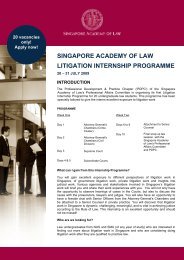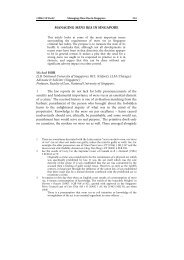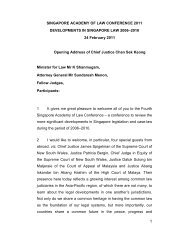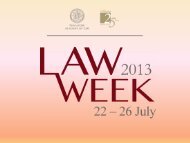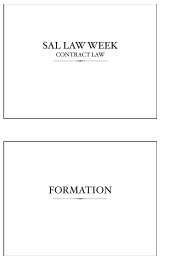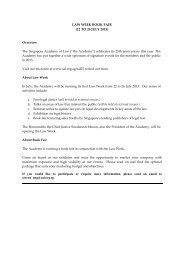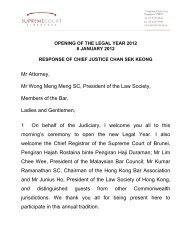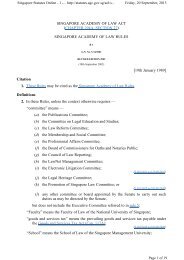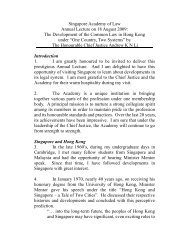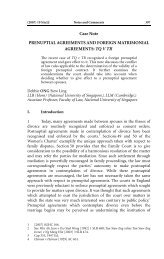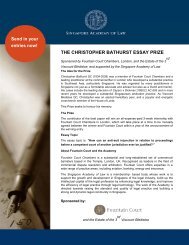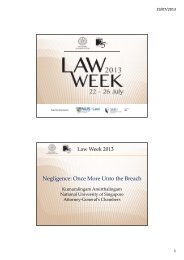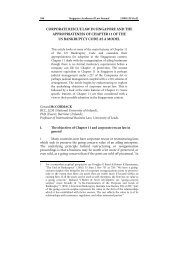View Article - Singapore Academy of Law
View Article - Singapore Academy of Law
View Article - Singapore Academy of Law
Create successful ePaper yourself
Turn your PDF publications into a flip-book with our unique Google optimized e-Paper software.
270<br />
<strong>Singapore</strong> <strong>Academy</strong> <strong>of</strong> <strong>Law</strong> Journal (2003)<br />
order is directed will <strong>of</strong>ten be the party whom the 3 rd party is aligned to.<br />
(In Ng Kim Seng, supra, for example, the wife was ordered to repay her<br />
own father the loan that he gave the husband and wife to purchase the<br />
matrimonial home.) In the light <strong>of</strong> the relationship between the 3 rd party<br />
and the original party the 3 rd party is aligned to, it is unlikely that the 3 rd<br />
party would take legal steps to enforce the order, and that there would be<br />
any future litigation in this regard.<br />
136 Alternatively, the order may be drafted in such a manner that in<br />
practice the husband and/or wife will have no choice but to comply with<br />
it. For example, in the case <strong>of</strong> Lee Sew-Iam Richard, supra, the<br />
matrimonial home was ordered to be sold, and the net proceeds divided<br />
between the parties only after the husband’s mother’s loan was repaid to<br />
her. The solicitors handling the conveyance <strong>of</strong> a property subject to this<br />
type <strong>of</strong> order would ensure that the 3 rd party would be repaid on the day<br />
<strong>of</strong> completion <strong>of</strong> the sale <strong>of</strong> the property.<br />
137 If there are findings made by the ancillary matters court in<br />
favour <strong>of</strong> or against the 3 rd party, but no orders are made for or against<br />
the 3 rd party, then the 3 rd party is not practically affected by the ancillary<br />
matters proceedings. It is the husband and/or the wife who would appeal<br />
against any orders directed against him/her, and not the 3 rd party. In the<br />
light <strong>of</strong> the relationship between the 3 rd party and the original party the<br />
3 rd party is aligned to, as well as considerations <strong>of</strong> time and expense, it is<br />
submitted that future litigation over issues which have already been dealt<br />
with by the ancillary matters court is, in practice, unlikely.<br />
138 In addition, there is the consideration for the original parties and<br />
the 3 rd party that, even though they are not bound by issue estoppel<br />
regarding the 3 rd party issues, the chances <strong>of</strong> the ordinary civil court<br />
making findings which are different from the court hearing the ancillary<br />
matters proceedings may not be high, particularly if the 3 rd party has<br />
given evidence in the ancillary matters proceedings.<br />
4.8 Order 15 Rule 13A<br />
139 Order 15 Rule 13A states:<br />
“(1) At any stage in an action to which this Rule applies, the<br />
Court may, on the application <strong>of</strong> any party or <strong>of</strong> its own motion,<br />
direct that notice <strong>of</strong> the action be served on any person who is<br />
not a party thereto but who will or may be affected by any<br />
judgment given therein.



